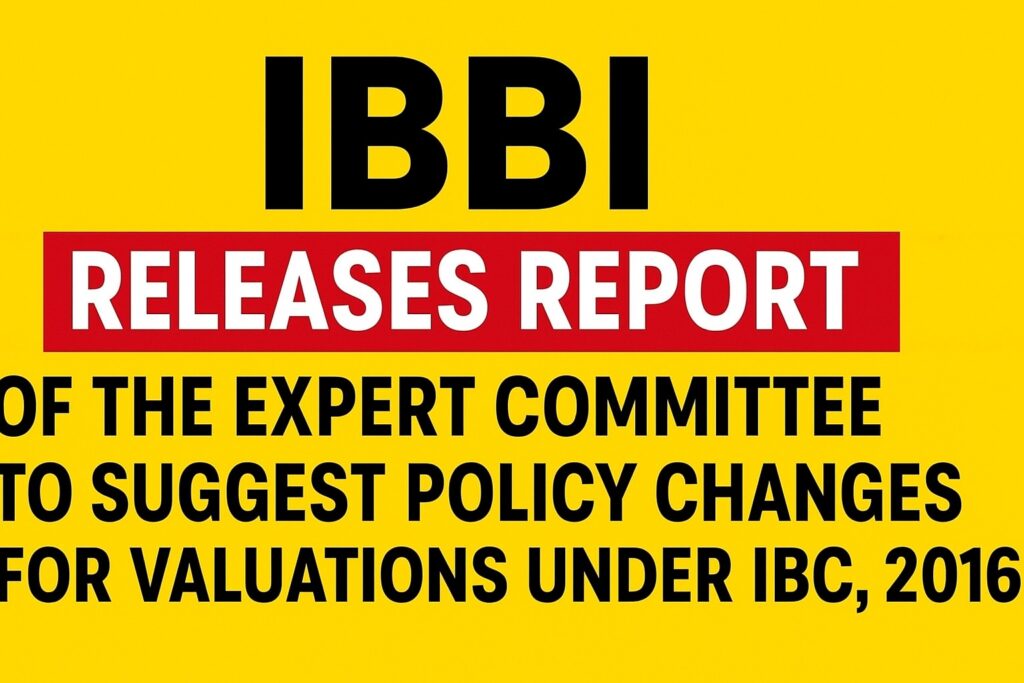IBBI RELEASES EXPERT COMMITTEE REPORT PROPOSING MAJOR POLICY REFORMS FOR VALUATION UNDER THE INSOLVENCY AND BANKRUPTCY CODE, 2016
A DETAILED ANALYSIS AND INDUSTRY UPDATE BY THE COUNCIL OF ENGINEERS AND VALUERS (CEV)
New Delhi, November 2025 — In a significant development with far-reaching implications for India’s insolvency ecosystem, the Insolvency and Bankruptcy Board of India (IBBI) has released the much-anticipated Report of the Expert Committee constituted under Office Order No. RVO-16/2/2025-IBBI dated 2 July 2025.
This committee was entrusted with reviewing and recommending comprehensive reforms to strengthen the valuation framework under the Insolvency and Bankruptcy Code (IBC), 2016.
Valuation has been a critical and sensitive component within the insolvency resolution process, often determining the course of revival or liquidation of distressed companies. The newly released report addresses structural gaps, inconsistencies, and operational challenges that valuation practitioners, creditors, and resolution professionals have faced over the years.
Mandate of the Expert Committee: Issues Examined
The committee was tasked with examining key aspects of valuation under the IBC and suggesting policy interventions. Its mandate covered the following major areas:
a) Standardisation of Valuation Report Format & Documentation
The committee was asked to:
-
Prescribe a uniform valuation report format
-
Define mandatory documentation
-
Streamline the valuation workflow for all assignments conducted under the IBC
This aims to eliminate inconsistencies between valuers and enhance comparability across reports.
b) Review of Definition of ‘Fair Value’ and ‘Liquidation Value’
The definitions under the IBBI (Insolvency Resolution Process for Corporate Persons) Regulations, 2016 were re-examined to:
-
Remove interpretational ambiguities
-
Improve alignment with global standards
-
Ensure consistent application in complex distress scenarios
These definitions have historically been central to disputes and litigation, making their clarity essential.
c) Feasibility of Appointing a Single Registered Valuer
The committee explored whether:
-
One valuer, instead of two, could be appointed for corporate debtors up to a certain asset size
-
This could improve efficiency, reduce costs, and minimize valuation disagreements
This proposal marks a potential shift from the dual-valuer system currently followed in corporate insolvency resolution processes (CIRP).
d) Any Other Matters Connected to Valuation under the Code
The committee was empowered to evaluate ancillary issues such as:
-
Risk disclosures
-
Documentation standards
-
Methodology transparency
-
Valuer independence and conflict-of-interest norms
-
Use of technology and digital documentation
Key Recommendations of the Expert Committee
The report presents comprehensive recommendations designed to enhance transparency, credibility, and uniformity in valuations carried out under the IBC. Some major recommendations include:
1. Uniform Valuation Report Format
A structured, standardised report template has been proposed, covering:
-
Executive summary
-
Scope and purpose
-
Methodologies applied and their rationale
-
Assumptions, limitations, caveats
-
Detailed workings
-
Market trends, recoverability considerations, and risk assessments
This uniformity is expected to reduce confusion and improve stakeholder confidence.
2. Revised Definitions of Fair Value and Liquidation Value
The committee suggests:
-
Updated definitions aligned with international valuation principles
-
Greater clarity on what constitutes market participants, distressed assumptions, and liquidation scenarios
-
Improved alignment with real-market behaviour
These revisions are aimed at resolving definitional disputes that often reach adjudicating authorities.
3. Single Valuer System for Smaller Corporate Debtors
The report recommends:
-
Appointing one Registered Valuer for companies below a prescribed asset threshold
-
Retaining the two-valuer mechanism for larger or more complex cases
This is expected to streamline valuation timelines and reduce cost burdens.
4. Enhanced Documentation & Justification Requirements
Valuers will be mandated to maintain:
-
A comprehensive trail of data sources
-
Justification of methodologies
-
Evidence-based assumptions
-
Disclosures on material risks, challenges, and uncertainties
Such documentation reduces the scope for ambiguity and strengthens legal defensibility.
5. Conflict of Interest Disclosures
To reinforce independence and transparency:
-
Strict declarations of conflict of interest will be required
-
Prior relationships or financial interests must be disclosed
This aligns with global best practices in valuation governance.
6. Strengthening Professional Accountability
The report proposes:
-
Greater responsibility on valuers to ensure diligence
-
Mandatory compliance with valuation standards
-
Possible disciplinary pathways for non-compliance
Impact on the Insolvency Ecosystem
The recommendations of the Expert Committee are expected to have a substantial positive impact:
For Creditors
-
Easier comparison of valuation reports
-
Better understanding of risks and assumptions
-
Reduced disputes and litigation
For Investors and Resolution Applicants
-
Clearer insights into distressed asset values
-
More reliable information for designing resolution plans
For Registered Valuers
-
Defined expectations and uniform templates
-
Reduced ambiguity in methodology and reporting
-
Enhanced professional credibility
For Adjudicating Authorities
-
Minimisation of valuation-related disputes
-
More defensible and technically robust reports
The Council of Engineers and Valuers (CEV) acknowledges that these reforms will significantly strengthen the country’s valuation ecosystem by ensuring consistency, transparency, professional rigour, and stakeholder trust.
CEV View: A Transformational Step Towards Strengthening Valuation Culture in India
CEV recognises that valuation under the IBC is not merely a technical exercise but a decisive factor influencing the financial recovery of creditors and the survival of distressed companies.
The Expert Committee’s recommendations provide a path toward:
-
Greater standardisation
-
Improved professional accountability
-
Enhanced data reliability
-
Reduction in litigation
-
Faster and more efficient resolution processes
If adopted, these reforms will serve as a paradigm shift in India’s insolvency framework, ultimately contributing to better recovery outcomes and stronger institutional confidence.
— Council of Engineers & Valuers (CEV)
Committed to Professional Excellence in Valuation
CLICK THE BUTTON BELOW TO GET THE FULL DISCUSSION PAPER


